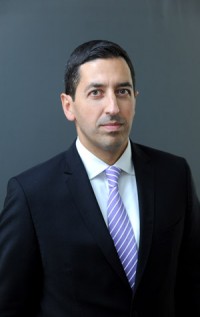School of Public Health Has a New Dean

Sandro Galea, an internationally respected physician and epidemiologist known for his research linking health to such social disadvantages as poverty and lack of education, has been appointed the new dean of the School of Public Health. Galea, currently the Anna Cheskis Gelman and Murray Charles Gelman Professor and chair of the department of epidemiology at Columbia University’s Mailman School of Public Health, will assume the BU post on January 1.
“We are delighted to have Professor Galea join us as leader of the Boston University School of Public Health,” says Jean Morrison, BU provost and chief academic officer. “He has an extraordinary track record for research and leadership, and he is well positioned to move the School of Public Health ahead in quality and stature. Given the breadth and depth of his research, we believe that he will be the kind of transformational leader who can help the school redefine its strategic emphasis.”
Galea says he is excited about joining the BU community. “This is a school of public health with a long history of excellence,” he says. “Its work and its reputation have soared in recent decades, and it will be a privilege for me to be part of the next phase of its evolution.”
Galea says he has long admired the faculty, the school, and the leadership of Robert Meenan (MED’72, GSM’89), who announced last year that he would step down after 21 years as dean.
“I am very pleased that Dr. Galea will join us as dean of the School of Public Health,” says President Robert A. Brown. “He brings exceptional experience, distinguished credentials, vision, and energy to this critical role. Public health, especially in urban environments here and around the globe, is vitally important, and our school can be a leader in education and research. I believe we are poised to reach new levels of excellence under Dr. Galea’s leadership.”
Galea, who in 2006 was named one of Time magazine’s epidemiology innovators, serves on the New York City Board of Health and is chair of the New York City Department of Health and Mental Hygiene’s Community Services Board. His research has examined many aspects of public health, from the causes of brain disorders to the consequences of mass trauma and conflict worldwide, including the September 11 attacks, Hurricane Katrina, conflicts in sub-Saharan Africa, and the American wars in Iraq and Afghanistan. He was the lead author on a groundbreaking study published in the American Journal of Public Health in 2011 that calculated the number of deaths caused by six social factors. That study, a meta-analysis of 47 earlier studies, concluded that each year 133,000 deaths could be attributed to poverty and 176,000 deaths could be attributed to racial segregation.
Galea has published more than 450 scientific journal articles, 50 book chapters and commentaries, and 9 books. His latest book, coauthored with Katherine Keyes, is the textbook Epidemiology Matters: A New Introduction to Methodological Foundations. He is a past president of the Society for Epidemiologic Research and an elected member of the American Epidemiological Society and of the Institute of Medicine of the National Academy of Sciences. Galea trained as a primary care physician at the University of Toronto and practiced in rural communities in Canada and Somalia. He then returned to academia and earned a master’s degree in public health at Harvard and a DrPH at Columbia.
Brian Jack, a School of Medicine professor and chair of family medicine, who headed the search committee, says Galea was chosen from a large pool of very qualified candidates. “Dr. Galea stood out for his forward-thinking approach to public health and his vast experience at Columbia leading a large department,” says Jack. “I believe he is a once-in-a-generation scholar, teacher, and administrator who will bring a wealth of experience in urban health.”
Karen Antman, dean of the School of Medicine and provost of the BU Medical Campus, says Galea is an outstanding choice.
“We are pleased to welcome such a highly respected epidemiologist as the new dean of SPH,” says Antman. “In addition to welcoming Dr. Galea, I’d like to thank Dr. Meenan for his vision and leadership in positioning SPH as a leader among schools of public health.”
“These are tremendously exciting times in public health,” Galea says. “A great school of public health has the responsibility to produce the scholarship that informs public health action and educates students and leadership for the coming decades. I am thrilled to be part of the community that embraces this responsibility.”
This BU Today story was written by